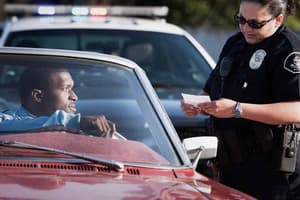Podcast
Questions and Answers
Match the following reports and studies with their findings or topics:
Match the following reports and studies with their findings or topics:
Bradley Report (2009) = Over-representation of people with intellectual or learning disabilities in the criminal justice system A 2014 study of 200 detainees in SE London = 6.7% had a learning disability Information provided by the Royal College of Psychiatrists (RCPsych) = Diverse range of mental disorders encountered by healthcare professionals http://www.bild.org.uk/resources/factsheets/ = Further reading and information about population prevalence of learning disabilities
Match the following mental disorders with their descriptions:
Match the following mental disorders with their descriptions:
Mental illnesses = Conditions with a disturbance in mental state and functioning Adjustment disorders = Conditions with a disturbance in mental state and functioning Substance misuse disorder = Conditions with a disturbance in mental state and functioning Undiagnosed mental disorders = Mental disorders which have not caused individuals to seek medical advice
Match the following individuals or groups with their role or situation in mental health care:
Match the following individuals or groups with their role or situation in mental health care:
GP = Treats majority of patients suffering from a mental disorder in the community Healthcare professional with relevant training and expertise = Treats majority of patients suffering from a mental disorder in the community People with intellectual or learning disabilities = Over-represented in the criminal justice system Individuals with undiagnosed mental disorders = May be many in the community
Match the following sections of the Act with their primary descriptions:
Match the following sections of the Act with their primary descriptions:
Match the following terms with their definitions:
Match the following terms with their definitions:
Match the following terms with their definitions under the Act:
Match the following terms with their definitions under the Act:
Match the following roles with their responsibilities in the Mental Health Review Tribunals (MHRT):
Match the following roles with their responsibilities in the Mental Health Review Tribunals (MHRT):
Match the following sections of the Policing and Crime Act, 2017 with their respective provisions:
Match the following sections of the Policing and Crime Act, 2017 with their respective provisions:
Match the following sections of the Policing and Crime Act, 2017 with their respective changes:
Match the following sections of the Policing and Crime Act, 2017 with their respective changes:
Match the following sections of the Policing and Crime Act, 2017 with their respective legislative outcomes:
Match the following sections of the Policing and Crime Act, 2017 with their respective legislative outcomes:
Match the sections of the Mental Health Act with their descriptions:
Match the sections of the Mental Health Act with their descriptions:
Match the following terms with their definitions under the Mental Health Act:
Match the following terms with their definitions under the Mental Health Act:
Match the following procedures with their requirements under the Mental Health Act:
Match the following procedures with their requirements under the Mental Health Act:
Match the following sections of the Mental Health Act with their corresponding actions:
Match the following sections of the Mental Health Act with their corresponding actions:
Match the following sections of the Mental Health Act with their lengths of detention:
Match the following sections of the Mental Health Act with their lengths of detention:
Match the following sections of the Mental Health Act with their types of order:
Match the following sections of the Mental Health Act with their types of order:
Match the following sections of the Mental Health Act with the persons implementing it:
Match the following sections of the Mental Health Act with the persons implementing it:
Match the following sections of the Mental Health Act with their reasons for implementation:
Match the following sections of the Mental Health Act with their reasons for implementation:
Match the following mental health care settings with their corresponding descriptions:
Match the following mental health care settings with their corresponding descriptions:
Match the following mental health legislation with their corresponding jurisdictions:
Match the following mental health legislation with their corresponding jurisdictions:
Match the following topics with their corresponding mental health law aspects:
Match the following topics with their corresponding mental health law aspects:
Match the following amendments made in the 2007 Act with their descriptions:
Match the following amendments made in the 2007 Act with their descriptions:
Match the roles with their descriptions:
Match the roles with their descriptions:
Match the principles with their definitions:
Match the principles with their definitions:
Match the mental disorders with their definitions under the Act:
Match the mental disorders with their definitions under the Act:
Match the conditions with their applicability for detention under the Act:
Match the conditions with their applicability for detention under the Act:
Flashcards are hidden until you start studying


